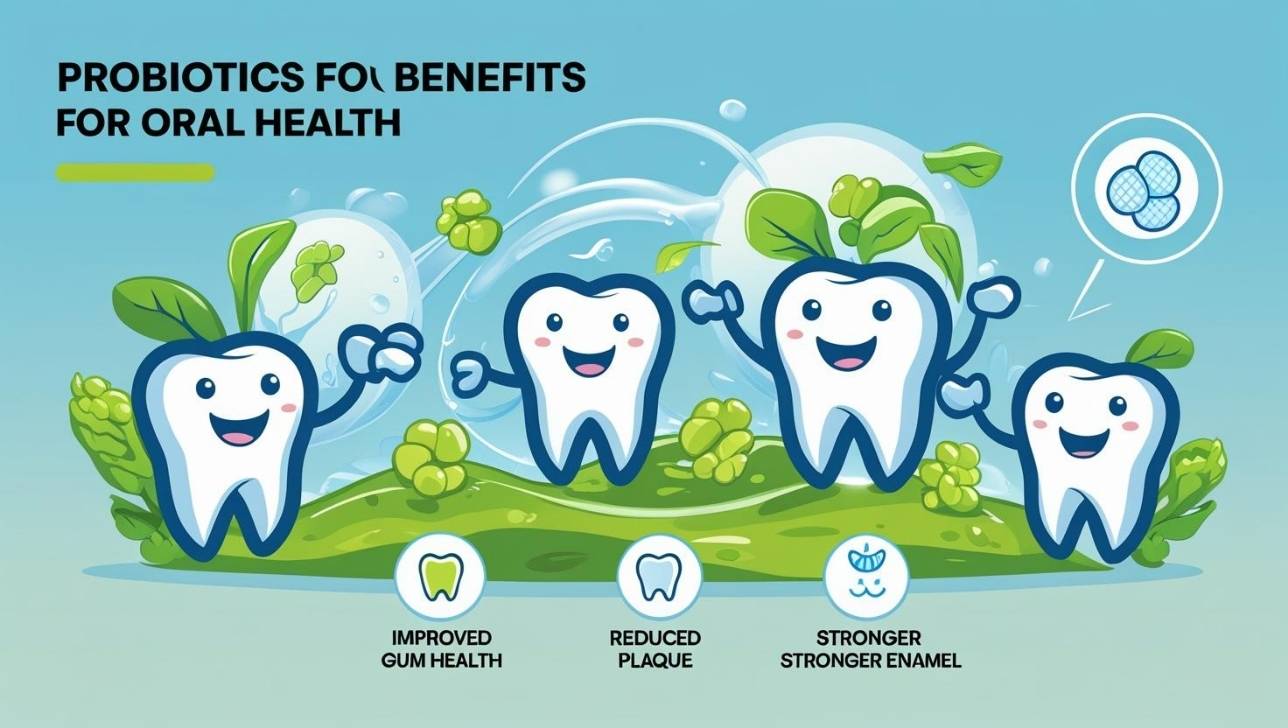Enhancing Oral Health Through Probiotics: A Comprehensive Guide
Probiotics have gained significant attention in recent years for their potential to enhance overall health, including oral health. By introducing beneficial bacteria into your mouth, probiotics can help balance the microbial ecosystem, leading to improved dental health. Here’s a comprehensive guide to understanding how probiotics can benefit your oral health.
Understanding Probiotics
Probiotics are live microorganisms, typically bacteria or yeasts, that when consumed in adequate amounts, confer health benefits on the host. In the context of oral health, probiotics work by promoting the growth of beneficial bacteria while inhibiting harmful ones. This balance helps prevent tooth decay, gum disease, and other oral infections.
How Probiotics Benefit Oral Health
- Reducing Bad Breath: Certain probiotics can help reduce bad breath by lowering the levels of sulfur compounds produced by harmful bacteria.
- Preventing Tooth Decay: Probiotics like Lactobacillus reuteri can inhibit the growth of cavity-causing bacteria such as Streptococcus mutans.
- Fighting Gum Disease: Probiotics can reduce inflammation associated with gum disease by modulating the immune response and reducing pathogenic bacteria.
- Improving Overall Oral Microbiome: By maintaining a healthy balance of oral bacteria, probiotics contribute to a healthier oral environment.
Types of Probiotics for Oral Health
Different strains of probiotics offer distinct benefits for oral health:
| Strain | Benefits |
|---|---|
| Lactobacillus reuteri | Reduces plaque and gingivitis |
| Lactobacillus rhamnosus | Helps in preventing tooth decay |
| Streptococcus salivarius | Supports oral immunity and reduces bad breath |
Before you buy, check out what thousands of happy customers say!
Probiotics into Your Routine
To reap the benefits of probiotics for your oral health, consider these practical steps:
- Include probiotic-rich foods in your diet such as yogurt, kefir, sauerkraut, and kimchi.
- Use probiotic supplements specifically formulated for oral health.
- Consider using probiotic mouthwashes or toothpaste.
- Maintain a balanced diet rich in prebiotics, which feed the probiotics and support their growth.
Research and Evidence
Several studies have explored the impact of probiotics on oral health. For instance, a study published in the Journal of Clinical Periodontology found that participants who used probiotic lozenges had significantly lower levels of harmful bacteria compared to those who did not. Another study in the International Journal of Dental Hygiene demonstrated that probiotic supplementation could reduce the incidence of early childhood caries.
Common Misconceptions About Probiotics and Oral Health
There are several misconceptions surrounding probiotics and oral health:
- Misconception 1: All probiotics are the same.
Reality: Different strains have different effects. Choose probiotics based on your specific oral health needs. - Misconception 2: Probiotics can replace brushing and flossing.
Reality: While beneficial, probiotics do not replace good oral hygiene practices. Continue to brush and floss regularly. - Misconception 3: Probiotics cause tooth decay.
Reality: Probiotics are designed to promote a healthy balance of bacteria and do not cause tooth decay.
Integrating probiotics into your oral care routine can significantly enhance your oral health by promoting a healthy microbial balance. Whether through dietary changes, supplements, or specialized products, incorporating probiotics offers a promising approach to maintaining strong, healthy teeth and gums. Always consult with a healthcare provider to determine the best approach tailored to your individual needs.
The Role of Probiotics in Combating Common Oral Diseases
Probiotics are live microorganisms that offer numerous health benefits when consumed in adequate amounts. While often associated with gut health, probiotics also play a significant role in maintaining oral health. By introducing beneficial bacteria into the mouth, probiotics can help combat common oral diseases, enhance the overall health of the oral microbiome, and promote a healthier smile.
One of the most prevalent oral diseases is dental caries, commonly known as tooth decay. This condition occurs when harmful bacteria in the mouth produce acids that erode tooth enamel. Probiotics can help prevent dental caries by crowding out these harmful bacteria. Studies have shown that certain strains of probiotics, such as Lactobacillus rhamnosus and Lactobacillus reuteri, can adhere to tooth surfaces and inhibit the growth of cariogenic bacteria like Streptococcus mutans. For instance, a study published in the Journal of Dental Research demonstrated that children who consumed milk fortified with Lactobacillus rhamnosus had significantly lower levels of Streptococcus mutans compared to those who did not consume the probiotic-fortified milk.
| Probiotic Strain | Common Sources | Health Benefits |
|---|---|---|
| Lactobacillus rhamnosus | Fermented dairy products, yogurt, kefir | Reduces levels of Streptococcus mutans, enhances oral health |
| Lactobacillus reuteri | Yogurt, cheese, probiotic supplements | Improves gum health, reduces plaque formation |
| Bifidobacterium lactis | Yogurt, fermented foods, probiotic supplements | Supports overall gut health, indirectly improves oral health |
Periodontal disease, which includes gingivitis and periodontitis, is another common oral condition caused by bacterial infection. Probiotics can help manage this disease by reducing inflammation and promoting healing. A study published in the Journal of Clinical Periodontology found that individuals who used a probiotic mouthwash containing Lactobacillus reuteri experienced significant improvements in gum health and reduced levels of harmful bacteria. Additionally, probiotics can help restore the balance of the oral microbiome, preventing the overgrowth of pathogenic bacteria that lead to periodontal disease.
Mouth ulcers, also known as canker sores, are painful lesions that can develop inside the mouth. These ulcers can be triggered by various factors, including stress, injury, and nutritional deficiencies. Probiotics may help reduce the frequency and severity of mouth ulcers by supporting the immune system and maintaining a healthy oral environment. A review published in the Journal of Oral Pathology & Medicine highlighted several studies indicating that probiotics could alleviate symptoms and speed up the healing process of mouth ulcers.
Halitosis, commonly known as bad breath, is another common oral issue that affects many people. It is primarily caused by volatile sulfur compounds produced by bacteria in the mouth. Probiotics can help combat halitosis by reducing the levels of these odor-causing bacteria. A study published in the International Journal of Dental Hygiene showed that participants who used a probiotic mouthwash experienced a significant reduction in bad breath compared to those who used a placebo mouthwash. This suggests that probiotics can contribute to fresher breath and improved oral hygiene.
To incorporate probiotics into your daily routine, consider adding probiotic-rich foods to your diet. Foods like yogurt, kefir, sauerkraut, and kimchi are excellent sources of beneficial bacteria. You can also opt for probiotic supplements, which are available in various forms, including capsules, tablets, and powders. When choosing a supplement, look for products that contain multiple strains of probiotics, as this can enhance their effectiveness. Additionally, using probiotic-infused dental products, such as toothpaste and mouthwash, can further support oral health.
Probiotics offer a promising approach to combating common oral diseases. By introducing beneficial bacteria into the mouth, probiotics can help prevent tooth decay, manage periodontal disease, alleviate mouth ulcers, and reduce bad breath. probiotics into your daily routine through diet or supplements can significantly enhance your oral health and contribute to a healthier smile. As research in this field continues to evolve, the potential applications of probiotics in oral care are likely to expand, offering even more benefits to those seeking to maintain optimal oral health.
Best-selling product! Order now before it’s out of stock!
Conclusion
Probiotics offer a promising path toward better oral health, addressing issues like cavities, gum disease, and bad breath by promoting a balanced microbial environment in your mouth. By incorporating probiotics into your daily routine through supplements or foods like yogurt and kefir, you can fortify your defenses against harmful bacteria. Remember, maintaining a healthy mouth isn’t just about brushing and flossing; it’s also about nurturing beneficial bacteria. With ongoing research uncovering new benefits, the future of oral care looks even more promising. Embrace this natural approach to safeguard your dental health and enjoy the peace of mind that comes with a healthier smile. Start today and see how probiotics can transform your oral wellness journey.


